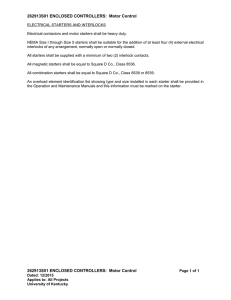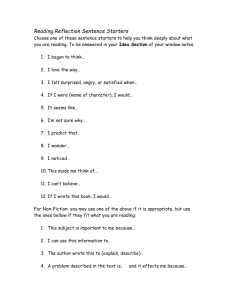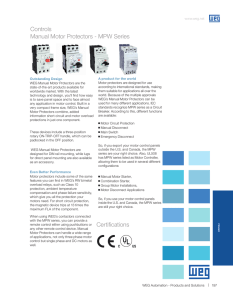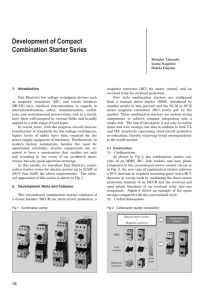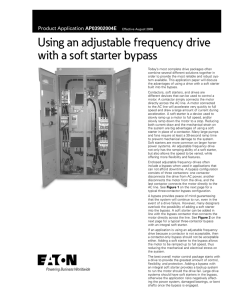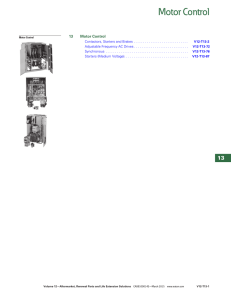Self-Protected Combination Starter Now Available
advertisement
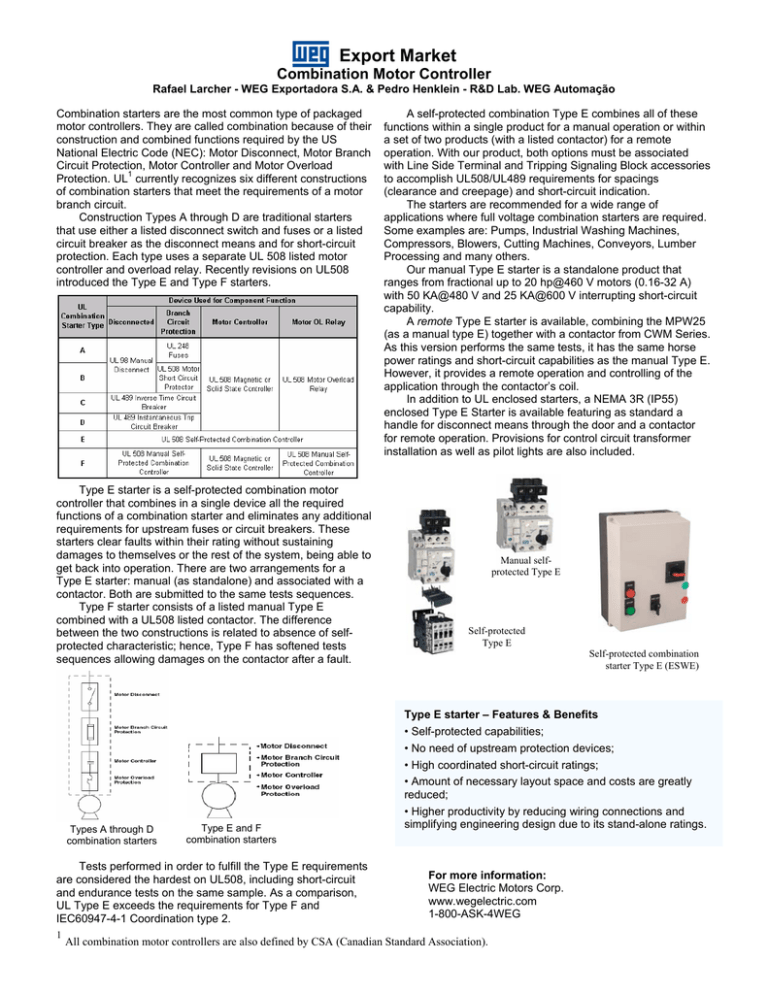
Export Market Combination Motor Controller Rafael Larcher - WEG Exportadora S.A. & Pedro Henklein - R&D Lab. WEG Automação Combination starters are the most common type of packaged motor controllers. They are called combination because of their construction and combined functions required by the US National Electric Code (NEC): Motor Disconnect, Motor Branch Circuit Protection, Motor Controller and Motor Overload Protection. UL1 currently recognizes six different constructions of combination starters that meet the requirements of a motor branch circuit. Construction Types A through D are traditional starters that use either a listed disconnect switch and fuses or a listed circuit breaker as the disconnect means and for short-circuit protection. Each type uses a separate UL 508 listed motor controller and overload relay. Recently revisions on UL508 introduced the Type E and Type F starters. Type E starter is a self-protected combination motor controller that combines in a single device all the required functions of a combination starter and eliminates any additional requirements for upstream fuses or circuit breakers. These starters clear faults within their rating without sustaining damages to themselves or the rest of the system, being able to get back into operation. There are two arrangements for a Type E starter: manual (as standalone) and associated with a contactor. Both are submitted to the same tests sequences. Type F starter consists of a listed manual Type E combined with a UL508 listed contactor. The difference between the two constructions is related to absence of selfprotected characteristic; hence, Type F has softened tests sequences allowing damages on the contactor after a fault. Types A through D combination starters Type E and F combination starters Tests performed in order to fulfill the Type E requirements are considered the hardest on UL508, including short-circuit and endurance tests on the same sample. As a comparison, UL Type E exceeds the requirements for Type F and IEC60947-4-1 Coordination type 2. 1 A self-protected combination Type E combines all of these functions within a single product for a manual operation or within a set of two products (with a listed contactor) for a remote operation. With our product, both options must be associated with Line Side Terminal and Tripping Signaling Block accessories to accomplish UL508/UL489 requirements for spacings (clearance and creepage) and short-circuit indication. The starters are recommended for a wide range of applications where full voltage combination starters are required. Some examples are: Pumps, Industrial Washing Machines, Compressors, Blowers, Cutting Machines, Conveyors, Lumber Processing and many others. Our manual Type E starter is a standalone product that ranges from fractional up to 20 hp@460 V motors (0.16-32 A) with 50 KA@480 V and 25 KA@600 V interrupting short-circuit capability. A remote Type E starter is available, combining the MPW25 (as a manual type E) together with a contactor from CWM Series. As this version performs the same tests, it has the same horse power ratings and short-circuit capabilities as the manual Type E. However, it provides a remote operation and controlling of the application through the contactor’s coil. In addition to UL enclosed starters, a NEMA 3R (IP55) enclosed Type E Starter is available featuring as standard a handle for disconnect means through the door and a contactor for remote operation. Provisions for control circuit transformer installation as well as pilot lights are also included. Manual selfprotected Type E Self-protected Type E Self-protected combination starter Type E (ESWE) Type E starter – Features & Benefits • Self-protected capabilities; • No need of upstream protection devices; • High coordinated short-circuit ratings; • Amount of necessary layout space and costs are greatly reduced; • Higher productivity by reducing wiring connections and simplifying engineering design due to its stand-alone ratings. For more information: WEG Electric Motors Corp. www.wegelectric.com 1-800-ASK-4WEG All combination motor controllers are also defined by CSA (Canadian Standard Association).

